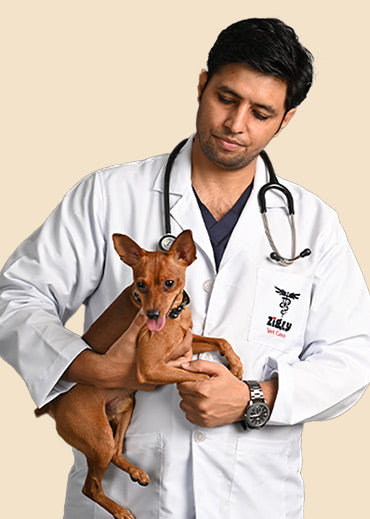Emergencies happen without warning, whether you're traveling or at home. While homes can be well-equipped, having a first-aid kit ready while traveling is even more crucial—for both you and your pets. An emergency is an emergency, whether for a human or a furry friend. Be prepared for minor issues with this comprehensive guide to preparing your own first-aid kit for your doggo and purry.
Before Getting Started
Collect all necessary documents and important paperwork that might help in an emergency, such as:
-
Pet’s generic details (sex, unique ID marks, breed, health concerns/allergies)
-
Pet’s vaccination record
-
Veterinarian’s contact information
-
Pet’s medical history
-
Any allergies
-
Pet parent’s/guardian’s active contact info
-
Local animal care center contact info
-
Emergency animal care center contact info
Store these documents safely in a zip-lock, water-repellent bag.
Generic First-Aid Kit for Pets

Note: Keep emergency contact information—including vaccination records, vet’s contact, your number, local poison control, and cash for calls—handy in the kit.
Prepare Your Own First-Aid Kit for Doggos
-
Organic or Latex-Free Gauze: For minor injuries (1 roll)
-
Self-Adhesive Non-Stick Bandages: Water-repellent, won’t stick to fur (1 pack)
-
Self-Adhesive Tape: Breathable and elastic for small wounds (1 roll)
-
Organic Cotton Balls: For applying medication or cleaning wounds (small pack)
-
3% Hydrogen Peroxide: Antiseptic for cleansing wounds (1 bottle)
-
Antibiotic Spray/Ointment: For cuts, rashes, allergies; keep cotton swabs (1)
-
Milk of Magnesia: For poisoning emergencies (consult vet for dosage) (1 bottle)
-
Digital Bendable Tip Medical Thermometer
-
Moisture Proof Medicine Pillbox: BPA-free, 8 compartments
-
Multi-Purpose Blunt-Tip Scissors: For cutting bandages (3-pack)
-
Pair of Pet-Friendly Tweezers: Stainless steel with slanted tips (1)
-
Magnifying Glass (3X Zoom): To inspect wounds or ticks (1)
-
Glucose or Gatorade: For dehydration (consult vet for dosage) (1 bottle)
-
Large Plastic Syringes: For oral medication or wound flushing (pack of 6)
-
Waterproof LED Flashlight: For emergencies (1)
-
Bone Dry Microfiber Towels: For wiping feet (2)
-
Soft Muzzle: To prevent biting when anxious or injured (1)
-
Water-Resistant Reflective Leash & Collar: Backup leash and collar (1 each)
-
Collapsible Non-Toxic Travel Bowls: For food and water on the go (1 set)
Prepare Your Own First-Aid Kit for Purries
-
Saline Wound Flush/Nasal Spray: For cleaning wounds (1)
-
Mild Wound Disinfectant: (e.g., diluted povidone iodine) (1)
-
Cotton Balls and Cotton-Tipped Q-Tips: For wound care and ear cleaning (1 pack)
-
Gauze Pads (Sponges): For cleaning wounds and dressing (5-10 pads)
-
Non-Stick Bandage Pads: For wound dressing that doesn’t stick (1-2 rolls)
-
Gauze Roll (2-Inch Width): For dressing (1-2 rolls)
-
Bandage Tape: Holds bandages in place, used for tricky spots (3M roll)
-
Blunt-Tipped Bandage Scissors: For safe removal of bandages (1)
-
Aluminum Splint Rolls: To stabilize injuries (1-2 rolls)
-
Self-Adhesive Bandage Cover: Keeps dressings secure without tape (1 roll)
-
3% Hydrogen Peroxide (or safer alternative): For inducing vomiting or de-skunking (vet consult needed)
-
Activated Charcoal: For poisoning treatment (vet consult required) (1)
-
Antibiotic Ointment: For bacterial infections on minor wounds
-
Saline Drops for Eyes: For flushing out irritants (1)
-
Lubricating Eye Drops: For dry or irritated eyes (1 bottle)
-
Digital Thermometer & Water-Based Lubricant: For temperature checks (recommended for rectal use)
-
Emergency Thermal Blankets: To keep warm during accidents (1-2)
-
Instant Cold Packs: For swelling, bruises, stings (2-4)
-
3X Magnifying Glass: For inspecting wounds or ticks (1)
-
Soft Muzzle: To prevent biting when anxious or injured (1)
-
Glucose or Gatorade: For dehydration (consult vet for dosage) (1 bottle)
-
Syringes: For oral medication or wound flushing (pack of 6)
-
Curved-Tip Tweezers & Old Credit Card: For tick removal and stinger removal (1 each)
CAUTION
Remove any harmful medications from your kit. Always consult your purry’s vet before adding any medicines. Avoid painkillers or anti-emetics accessible to your kitty, as overdoses can lead to severe health issues.
For more information or guidance on first aid supplies and pet care, you can book an online vet consultation or visit your nearest Zigly Experience Center.
FAQs
Q1: Why is a first-aid kit important for pets while traveling?
Emergencies can happen anywhere, and having a first-aid kit ensures you're prepared to handle minor injuries or illnesses promptly, reducing stress for both you and your pet.
Q2: What documents should I keep handy in the pet first-aid kit?
Keep vaccination records, vet contacts, medical history, allergy info, and emergency contacts securely stored in a waterproof bag.
Q3: Are there any special items I need for cats compared to dogs?
Yes, cats require gentler wound disinfectants, smaller-sized supplies, and specific items like lubricating eye drops and a smaller muzzle.
Q4: Can hydrogen peroxide be used on pet wounds?
Hydrogen peroxide is useful as an antiseptic but should be used cautiously, especially with cats, and not recommended for regular wound cleaning as it may slow healing.
Q5: How can I safely administer medication to my pet?
Use large plastic syringes for oral meds and consult your vet for dosage. Tweezers and other tools can help with removing ticks or splinters safely.




